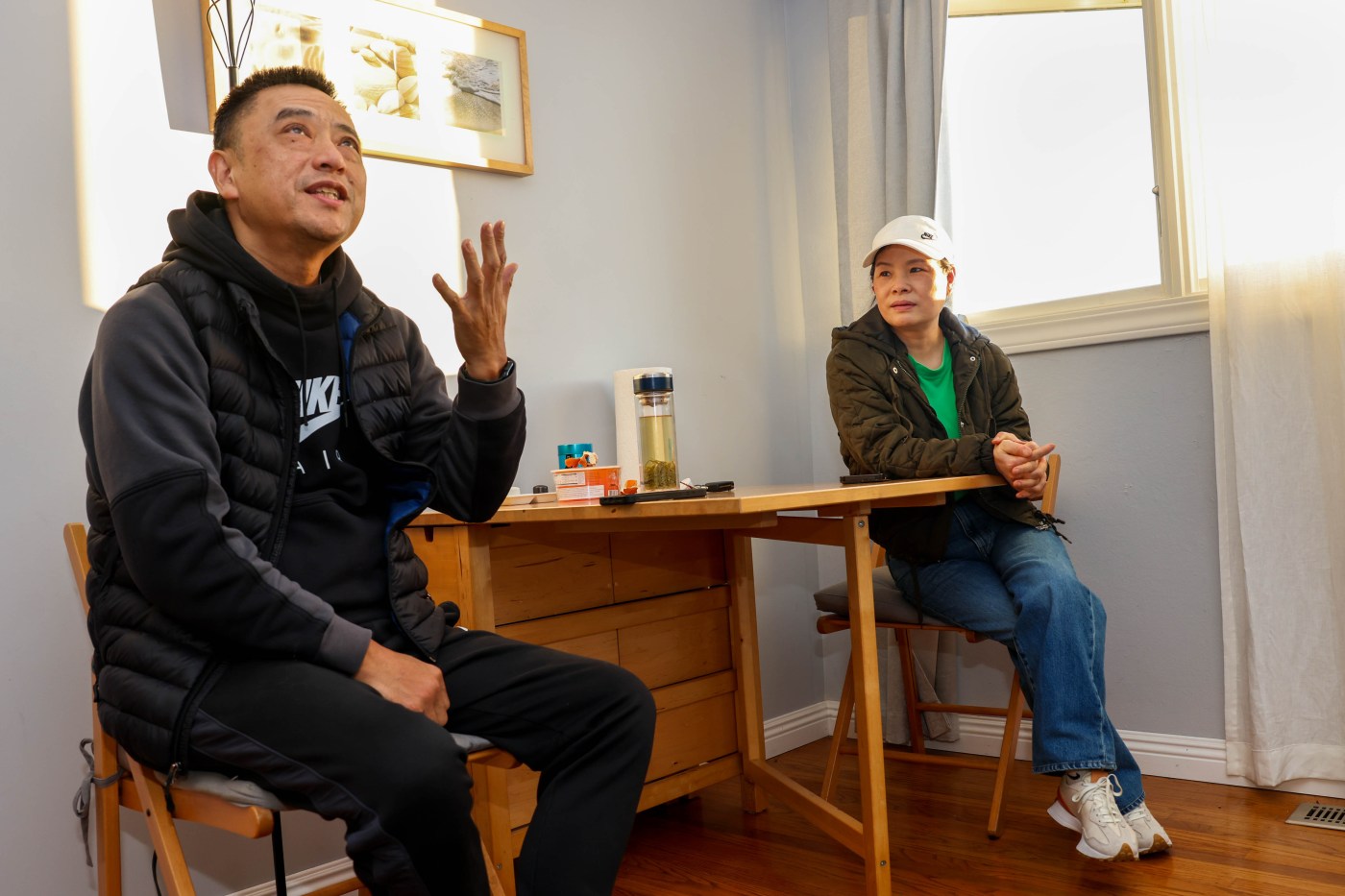
Two years after deadly Half Moon Bay shooting, survivors are in line for a permanent home. But other farmworkers are still in limbo
Although they have lived there for nearly a year, Jun Chen and Yan Wang still don’t use the kitchen in their temporary apartment at the top of the hill in Moss Beach. In the place for utensils on the drying rack beside their sink, the couple keeps their toothbrushes and a tube of toothpaste.
Chen and Wang still prepare most meals in the communal kitchen at Concord Farms in Half Moon Bay where they work. For years, they shared the space with several other workers who lived alongside them there in sparsely furnished rooms overlooking rows of mushroom cultivation trays.
That was before Jan. 23, 2023, the day their former co-worker, Chunli Zhao, went on a rampage at two farms in Half Moon Bay, fatally shooting seven immigrant farmworkers, including three of Chen and Wang’s colleagues. The shooting brought to light the harsh living conditions at the two mushroom farms, California Terra Garden and Concord Farms — mold-infested rooms that would flood regularly, and dilapidated shipping containers that often lacked heat and running water. In the immediate aftermath, the families were moved into temporary housing paid for by the county and city, and the housing at the farms was condemned and destroyed.
Two years later, some permanent farmworker housing is coming into view. In May, most of the families directly affected by the shooting will move into a new manufactured housing development at 880 Stone Pine Cove, with 47 trailers dedicated to housing farmworkers. A modest monthly rental payment will build equity for the families, allowing them to own the trailer outright after 20 years.
For survivors like Chen and Wang, it’s a milestone in their journey since the shooting, which has sent them shuffling between hotels and temporary housing.
“I have gained and I have lost,” Chen said in Mandarin through an interpreter.
Farmworker supervisor Juan Flores Lopez, left, works with Salvador Cruz, both mass shooting survivors at California Terra Garden Farms in Half Moon Bay, Calif., on Thursday, Jan. 23, 2025. Two years ago, seven of their colleagues were killed and one critically injured by a coworker at two mushroom farms. (Ray Chavez/Bay Area News Group)
But as the victims finally get a dignified place to live, it’s unclear whether San Mateo County has done enough to keep other farmworkers from experiencing similarly devastating conditions, and advocates say farmworkers throughout the state still live in subpar housing.
In the immediate aftermath of the shooting, the county established a task force to inspect housing at all farms on county-owned land. Two-thirds of the farms met minimum health and safety standards, and the county directed the other third to make improvements. At three farms, housing for farmers was red-tagged and families were required to move out.
At a news conference on Friday, San Mateo County Supervisor Ray Mueller announced a $2 million forgivable loan program that farmers and tenants can apply for to make improvements and repairs to their homes. He also said the county would consider streamlining its zoning process to make it easier to build farmworker housing. That’s on top of two bills signed into law by Gov. Gavin Newsom last year intended to help turn temporary migrant housing into permanent housing to allow migrant workers with families a stable place to live all year long.
Some survivors, though, worry that once they move into the new housing, they’ll be forgotten. Already, Juan Flores-Lopez, the manager of California Terra Garden, has seen how the community’s support has faded along with the collective memory of the massacre.
“In the beginning, people from the county were coming every day, asking us how we were doing,” Flores-Lopez said. “But as time passes, the support is diminishing. It’s totally different now.”
Interstate Grading and Paving, Inc. owner Craig Caron, left, and his construction workers work on the Stone Pine Cove Farmworkers Housing Project in Half Moon Bay, Calif., on Thursday, Jan. 23, 2025. (Ray Chavez/Bay Area News Group)
ALAS nonprofit founder Belinda Hernandez-Arriaga holds a Certificate of Appreciation presented by San Mateo County Supervisor Ray Mueller as members of the community attend a vigil in remembrance of the seven farmworkers killed by a coworker at two mushroom farms during the second-anniversary event in Half Moon Bay, Calif., on Thursday, Jan. 23, 2025. (Ray Chavez/Bay Area News Group)
Interstate Grading and Paving, Inc. owner Craig Caron shows the parcels where housing trailers will be installed on the Stone Pine Cove Farmworkers Housing Project in Half Moon Bay, Calif., on Thursday, Jan. 23, 2025. (Ray Chavez/Bay Area News Group)
Farmworker supervisor Juan Flores Lopez, right, works with Salvador Cruz, both mass shooting survivors at California Terra Garden Farms in Half Moon Bay, Calif., on Thursday, Jan. 23, 2025. Two years ago, seven of their colleagues were killed and one critically injured by a coworker at two mushroom farms. (Ray Chavez/Bay Area News Group)
Farmworker and mass shooting survivor Salvador Cruz reacts as he remembers his colleagues at California Terra Garden Farms in Half Moon Bay, Calif., on Thursday, Jan. 23, 2025. Two years ago, seven of his colleagues were killed and one critically injured by a coworker at two mushroom farms. (Ray Chavez/Bay Area News Group)
Members of the community attend a vigil in remembrance of the seven farmworkers killed by a coworker at two mushroom farms during the second-anniversary event in Half Moon Bay, Calif., on Thursday, Jan. 23, 2025. (Ray Chavez/Bay Area News Group)
Members of the community attend a vigil in remembrance of the seven farmworkers killed by a coworker at two mushroom farms during the second-anniversary event in Half Moon Bay, Calif., on Thursday, Jan. 23, 2025. (Ray Chavez/Bay Area News Group)
Farmworker and survivor Pedro Romero Perez and Gruoo Media Luna members perform a song dedicated to the late seven farmworkers during the second anniversary of the mass shooting in Half Moon Bay, Calif., on Thursday, Jan. 23, 2025. A coworker critically shot Romero while his brother, Jose Romero Perez, and five other colleagues were killed by the same suspect at two mushroom farms in Half Moon Bay (Ray Chavez/Bay Area News Group)
Members of the community attend a vigil in remembrance of the seven farmworkers killed by a coworker at two mushroom farms during the second-anniversary event in Half Moon Bay, Calif., on Thursday, Jan. 23, 2025. (Ray Chavez/Bay Area News Group)
Interstate Grading and Paving, Inc. owner Craig Caron, left, and his construction workers work on the Stone Pine Cove Farmworkers Housing Project in Half Moon Bay, Calif., on Thursday, Jan. 23, 2025. (Ray Chavez/Bay Area News Group)
Flores-Lopez has watched this year as Half Moon Bay’s planning commission stalled on approving a 40-unit apartment complex for senior farmworkers downtown. Residents complained the four-story building at 555 Kelly Ave. would change the city’s character and might create parking problems. Frustrated with the lack of movement on the project, Newsom even stepped up pressure on the city, threatening legal action.
After getting the commission’s reluctant sign-off in May and surviving appeals, the project seemed to be in the clear. But approvals took so long that the developer, Mercy Housing, missed deadlines to apply for funding it needs to start construction. Contracts that the city, which owns the land, had executed with Mercy also lapsed, and they must be renewed for Mercy to move forward. But with a new council in place — which includes the newly elected Paul Nagengast, one of the three appellants of the project — it’s not clear the project will move forward.
“It’s unconscionable to think that a person will come here and work their entire lives as a member of our economy, paying taxes, putting food on our tables, and then in their old age, are left with no safety net,” Mueller said.
It’s still a long way to retirement for Flores-Lopez, Chen and Wang. They’ve continued to show up at work since the shooting, and are constantly reminded of the colleagues they lost.
Farmworker and mass shooting survivor Miriam Flores packs boxes of mushrooms at California Terra Garden Farms in Half Moon Bay, Calif., on Thursday, Jan. 23, 2025. Two years ago, seven of her colleagues were killed and one critically injured by a coworker at two mushroom farms. (Ray Chavez/Bay Area News Group)
On Thursday, the second anniversary of the shooting, Chen and Wang shared memories of Aixang Zhang, 74, and Zhishen Liu, 73, some of the only friends they had made in isolation at the farm. At the end of the workday, the two couples would cook with each other and share dishes — Chen and Wang stir-frying chicken and vegetables in a traditional Southern Chinese style, and Zhang and Liu making dumplings, a Northern Chinese staple. The older couple would show Chen and Wang photos of their grandchildren, who they planned to visit in their retirement, which they would have taken this year.
These days, though, when Chen and Wang sit down for dinner at the farm, they eat alone.
“Before, we were always talking and chatting and cooking,” Chen said.
He’s looking forward to being in a community again. Even if he and the other workers don’t share a language, he knows they all came to the U.S. for the same reason — to provide better lives for their children, as he and Wang did when they moved from Wuhan six years ago.
“After I came to the U.S., I felt like I was starting life over,” Wang said. “After the shooting, it was like starting over again.”
Now, in five months, she and Chen will have their own space, and be on a path toward home ownership. Her daughter, 28, also just recently moved from China and started school at the College of San Mateo. Another chance at a new life. Another start. Again.
Concord Farms farmworkers and mass shooting survivors Yan Wange and Jun Chen stand by the window of their temporary home in Moss Beach, Calif., on Thursday, Jan. 23, 2025. Two years ago, seven of their colleagues were killed and one critically injured by a coworker at two mushroom farms. (Ray Chavez/Bay Area News Group)


